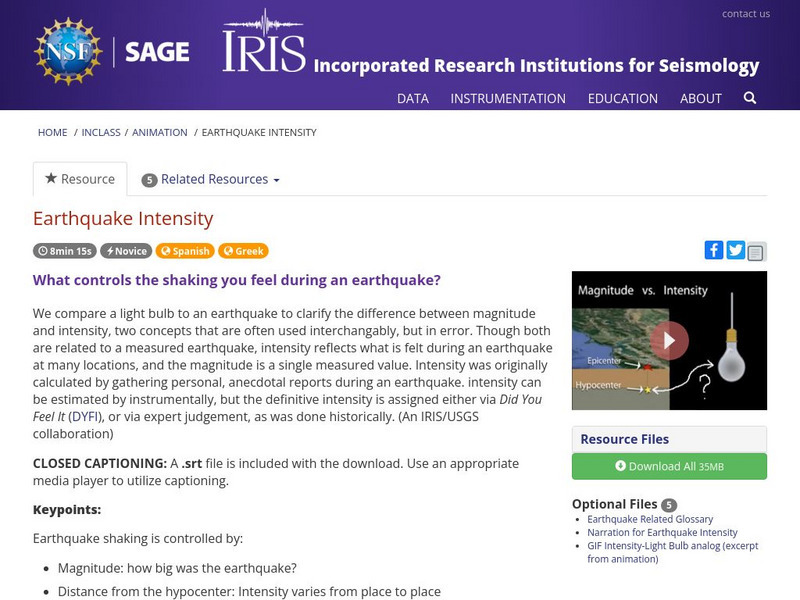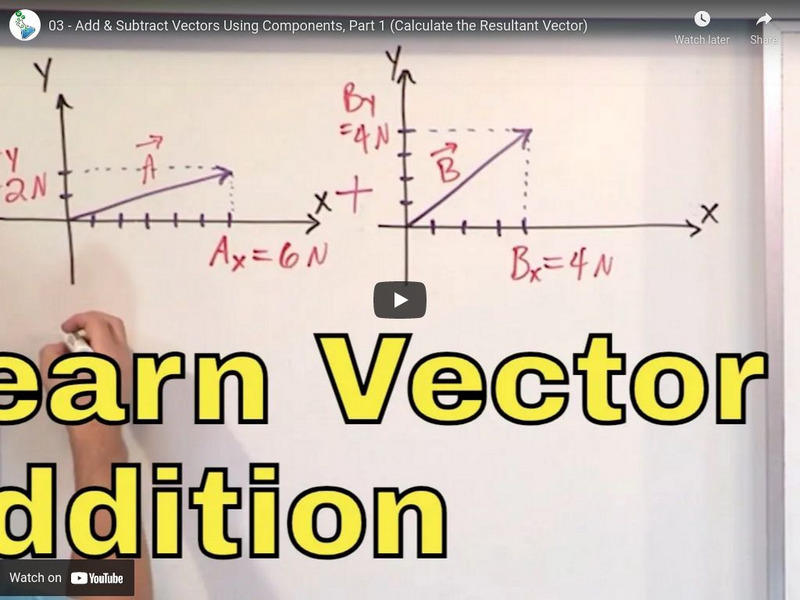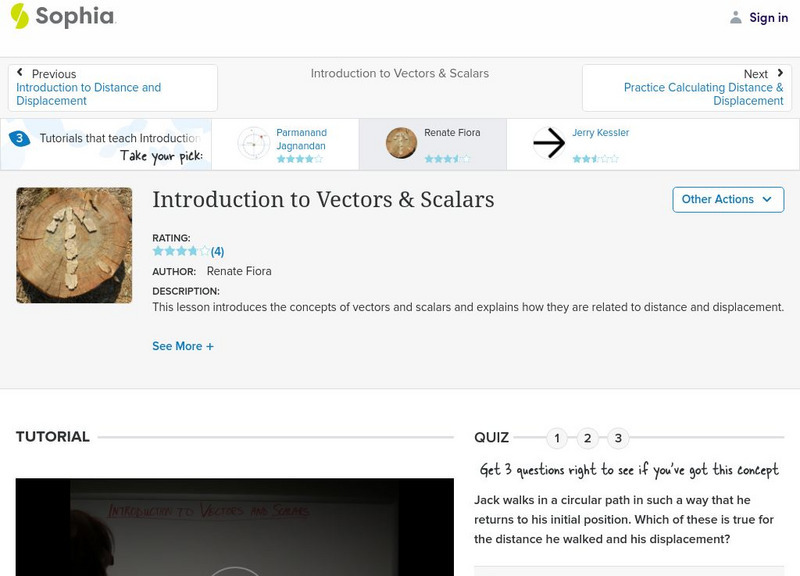Brightstorm
The Geometric Representation of Vectors - Concept
What do you get when you cross a mosquito with a mountain climber? Nothing, you can't cross a vector and a scalar. The first video offers an explanation for how a geometric representation of vectors is helpful when adding and can be used...
Scholastic
Study Jams! Earthquakes
Have a seismic moment with your class as you show this animated video on earthquakes. Viewers find that quakes occur on faults and are caused by shifting of continental plates. They learn what properties are studied by seismologists and...
Virtual Nerd
What is a Vector?
Define a vector and teach your class about the different parts of a vector with this video. An instructor conveys what a vector is, labeling the parts and providing multiple examples. Learners can re-watch this video if they are...
Khan Academy
Khan Academy: Pre Calculus: Basic Complex Analysis
A video [13:04] introducing complex analysis. Complex numbers are defined as a number having two parts: a real part and an imaginary part. The instructor shows how to graph these in the complex number plane. The video also explains how...
Khan Academy
Khan Academy: Pre Calculus: Exponential Form to Find Complex Roots
This video illustrates how the exponential form of a complex number can be helpful in finding the complex roots of a number. The process is shown both algebraically and graphically using x^3 = 1 as a simple example. [11:53]
Khan Academy
Khan Academy: Intro to Complex Analysis: Basic Complex Analysis
In this video lesson students explore complex number by looking at Argand Diagram, magnitude, modulus, argument and exponential form.
Sophia Learning
Sophia: Introduction to Vectors & Scalars
Learn about vectors and scalars in physics, and find out how they are related to distance and displacement. [5:19]
Sophia Learning
Sophia: Order of Magnitude
A video tutorial introduces the concept of order-of-magnitude, and explains how it is used to make estimations in physics. [2:13]
Virtual Nerd
Virtual Nerd: What Is a Vector?
Vectors have both length and a direction. Follow along with this tutorial to learn about vectors and their parts and also how to name one. [3:09]
Incorporated Research Institutions for Seismology
Iris: Mexico: Earthquakes & Tectonics
Discover what caused the earthquake in Mexico in 1985 and how they have instituted their Earthquake Early Warning system. This animation describes the mechanics. [7:46]
PatrickJMT
Patrick Jmt: An Introduction to Vectors Part 1
Tutorial provides an introduction to vectors including magnitude, direction, length, and component form. [4:45]
Incorporated Research Institutions for Seismology
Iris: Earthquake Intensity
Understand the three factors that affect earthquake intensity: magnitude, distance from the center, and Local rock and soil conditions. [8:15]
Other
Math Tutor Dvd: Add & Subtract Vectors Using Components, Part 1
Video tutorial provides step by step examples that show how to add vectors using the x-component and y-components of the vector. [27:08]
PatrickJMT
Patrick Jmt: Vectors: Finding Magnitude or Length
Easy to understand tutorial gives the formula and provides a couple examples of finding the magnitude, or length, or a vector. [3:32]
Khan Academy
Khan Academy: Question 1 C: 2015 Ap Physics 1 Free Response
Impact of adding a third mass to our string-pulley system. [8:43]
Sophia Learning
Sophia: Introduction to Vectors & Scalars: Lesson 2
This lesson introduces the concepts of vectors and scalars and explains how they are related to distance and displacement. It is 2 of 3 in the series titled "Introduction to Vectors & Scalars."
Sophia Learning
Sophia: Multiplying and Dividing Absolute Values: Lesson 10
In this lesson, students see how to multiply and divide numbers within absolute value notation. It is 10 of 11 in the series titled "Multiplying and Dividing Absolute Values."
Sophia Learning
Sophia: Multiplying and Dividing Absolute Values: Lesson 5
In this lesson, students see how to multiply and divide numbers within absolute value notation. It is 5 of 11 in the series titled "Multiplying and Dividing Absolute Values."
Sophia Learning
Sophia: Multiplying and Dividing Absolute Values: Lesson 7
In this lesson, students see how to multiply and divide numbers within absolute value notation. It is 7 of 11 in the series titled "Multiplying and Dividing Absolute Values."
Sophia Learning
Sophia: Multiplying and Dividing Absolute Values: Lesson 8
In this lesson, students see how to multiply and divide numbers within absolute value notation. It is 8 of 11 in the series titled "Multiplying and Dividing Absolute Values."
Sophia Learning
Sophia: Multiplying and Dividing Absolute Values: Lesson 9
In this lesson, students see how to multiply and divide numbers within absolute value notation. It is 9 of 11 in the series titled "Multiplying and Dividing Absolute Values."
Sophia Learning
Sophia: Multiplying and Dividing Absolute Values: Lesson 1
In this lesson, students see how to multiply and divide numbers within absolute value notation. It is 1 of 11 in the series titled "Multiplying and Dividing Absolute Values."
Sophia Learning
Sophia: Practice Calculating Distance & Displacement: Lesson 2
This lesson should provided the learner with example problems on finding the distance and displacement of an object. It is 2 of 2 in the series titled "Practice Calculating Distance & Displacement."
Sophia Learning
Sophia: Vectors & Scalars: Lesson 2
This lesson explains what the terms vector and scalar mean. It is 2 of 2 in the series titled "Vectors & Scalars."























